The Implications of Brexit on UK Waste Management Strategies
VerifiedAdded on 2020/06/04
|21
|7592
|51
Report
AI Summary
This report examines the multifaceted impact of Brexit on the UK's waste management sector. It begins with an introduction highlighting the influence of EU environmental legislation on UK waste policies and strategies, emphasizing the shift towards resource management and waste reduction. The main body delves into waste policies and strategies, including the waste hierarchy, diversion from landfills, recycling initiatives, and the reduction of waste from the economy. It also explores current waste management legislation, such as the Waste England and Wales Amendment Regulations 2012, the Battery Directive, and the Landfill Directive. The report further discusses the implications of the referendum on UK waste disposal, including hazardous waste management. The analysis covers the impact of these changes and the future of waste management in the UK after Brexit.
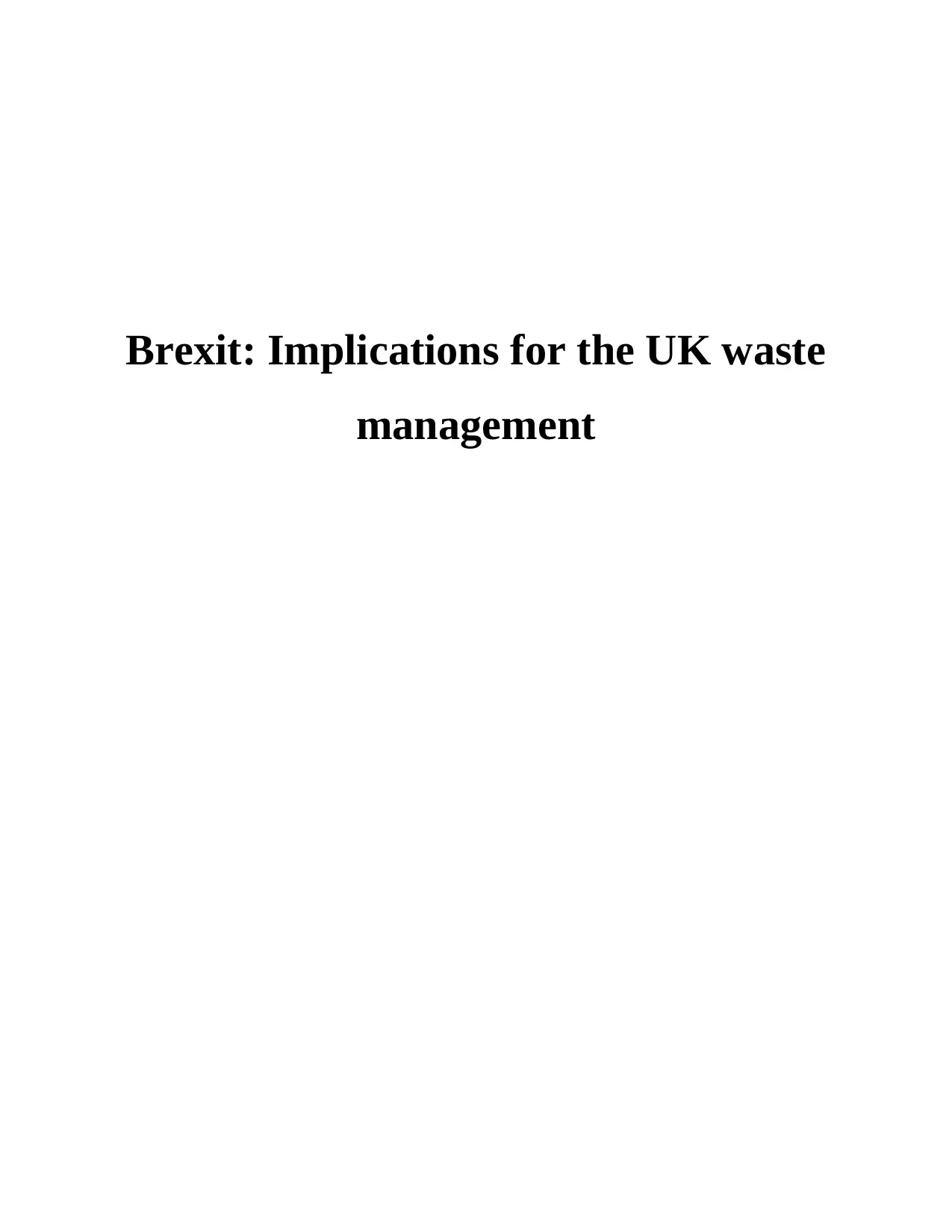
Brexit: Implications for the UK waste
management
management
Paraphrase This Document
Need a fresh take? Get an instant paraphrase of this document with our AI Paraphraser
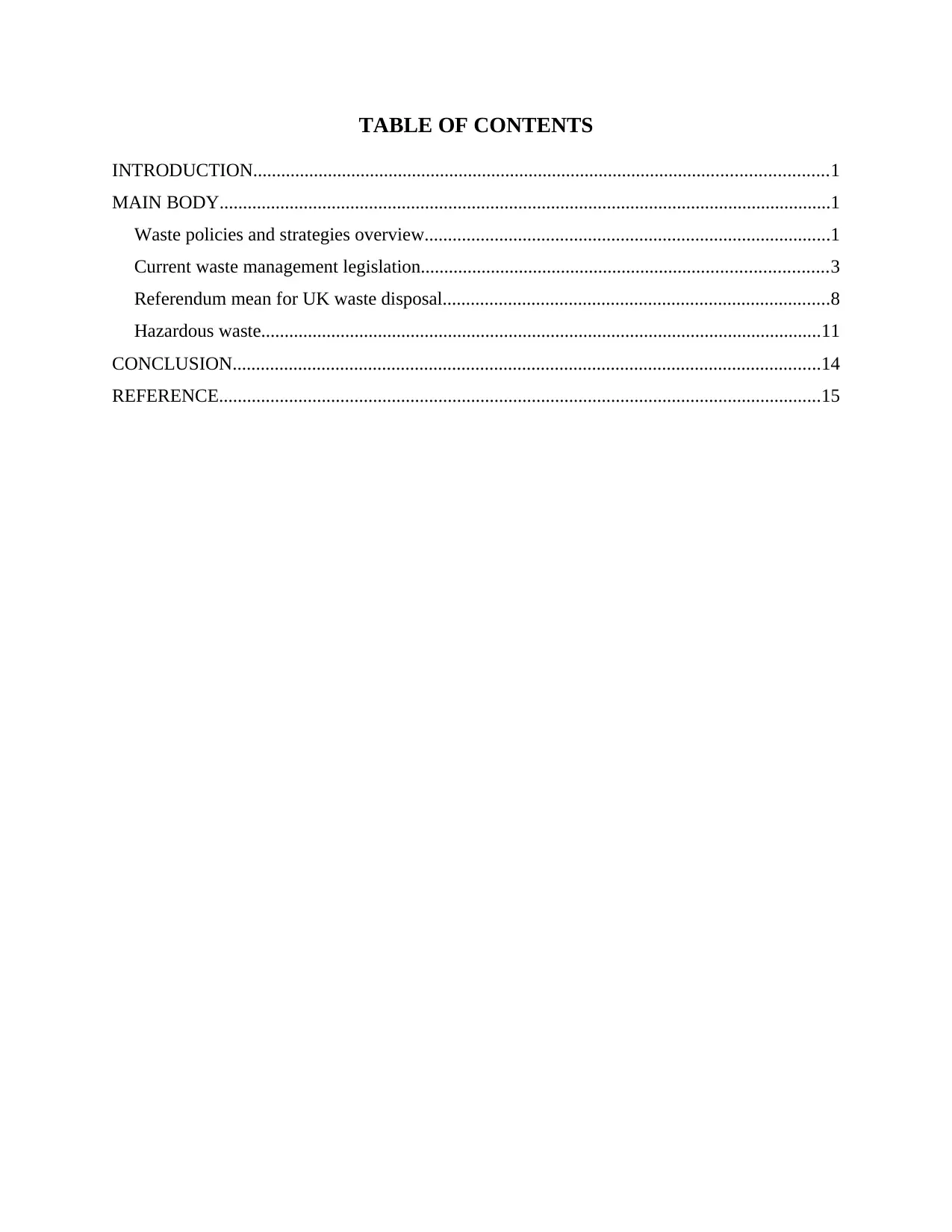
TABLE OF CONTENTS
INTRODUCTION...........................................................................................................................1
MAIN BODY...................................................................................................................................1
Waste policies and strategies overview.......................................................................................1
Current waste management legislation.......................................................................................3
Referendum mean for UK waste disposal...................................................................................8
Hazardous waste........................................................................................................................11
CONCLUSION..............................................................................................................................14
REFERENCE.................................................................................................................................15
INTRODUCTION...........................................................................................................................1
MAIN BODY...................................................................................................................................1
Waste policies and strategies overview.......................................................................................1
Current waste management legislation.......................................................................................3
Referendum mean for UK waste disposal...................................................................................8
Hazardous waste........................................................................................................................11
CONCLUSION..............................................................................................................................14
REFERENCE.................................................................................................................................15
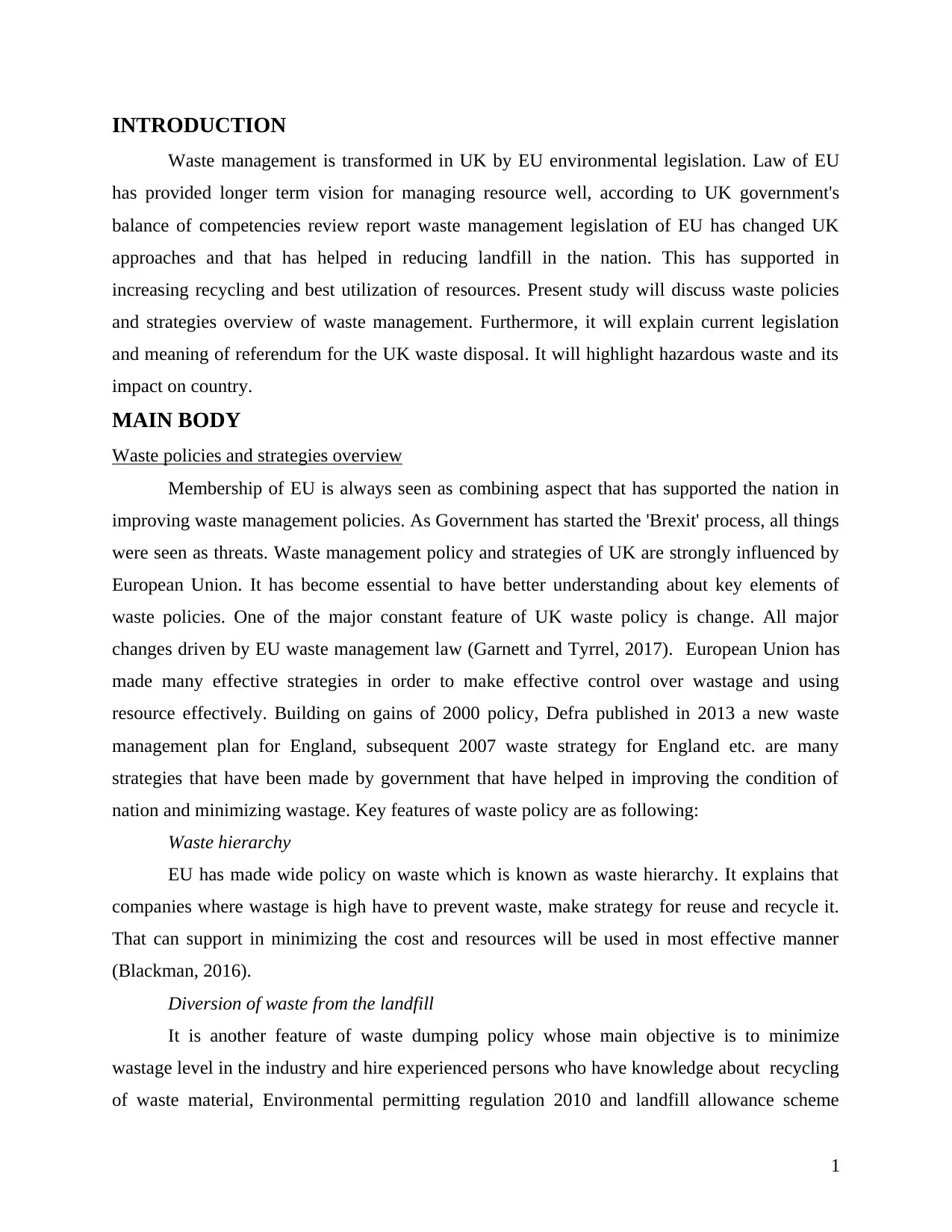
INTRODUCTION
Waste management is transformed in UK by EU environmental legislation. Law of EU
has provided longer term vision for managing resource well, according to UK government's
balance of competencies review report waste management legislation of EU has changed UK
approaches and that has helped in reducing landfill in the nation. This has supported in
increasing recycling and best utilization of resources. Present study will discuss waste policies
and strategies overview of waste management. Furthermore, it will explain current legislation
and meaning of referendum for the UK waste disposal. It will highlight hazardous waste and its
impact on country.
MAIN BODY
Waste policies and strategies overview
Membership of EU is always seen as combining aspect that has supported the nation in
improving waste management policies. As Government has started the 'Brexit' process, all things
were seen as threats. Waste management policy and strategies of UK are strongly influenced by
European Union. It has become essential to have better understanding about key elements of
waste policies. One of the major constant feature of UK waste policy is change. All major
changes driven by EU waste management law (Garnett and Tyrrel, 2017). European Union has
made many effective strategies in order to make effective control over wastage and using
resource effectively. Building on gains of 2000 policy, Defra published in 2013 a new waste
management plan for England, subsequent 2007 waste strategy for England etc. are many
strategies that have been made by government that have helped in improving the condition of
nation and minimizing wastage. Key features of waste policy are as following:
Waste hierarchy
EU has made wide policy on waste which is known as waste hierarchy. It explains that
companies where wastage is high have to prevent waste, make strategy for reuse and recycle it.
That can support in minimizing the cost and resources will be used in most effective manner
(Blackman, 2016).
Diversion of waste from the landfill
It is another feature of waste dumping policy whose main objective is to minimize
wastage level in the industry and hire experienced persons who have knowledge about recycling
of waste material, Environmental permitting regulation 2010 and landfill allowance scheme
1
Waste management is transformed in UK by EU environmental legislation. Law of EU
has provided longer term vision for managing resource well, according to UK government's
balance of competencies review report waste management legislation of EU has changed UK
approaches and that has helped in reducing landfill in the nation. This has supported in
increasing recycling and best utilization of resources. Present study will discuss waste policies
and strategies overview of waste management. Furthermore, it will explain current legislation
and meaning of referendum for the UK waste disposal. It will highlight hazardous waste and its
impact on country.
MAIN BODY
Waste policies and strategies overview
Membership of EU is always seen as combining aspect that has supported the nation in
improving waste management policies. As Government has started the 'Brexit' process, all things
were seen as threats. Waste management policy and strategies of UK are strongly influenced by
European Union. It has become essential to have better understanding about key elements of
waste policies. One of the major constant feature of UK waste policy is change. All major
changes driven by EU waste management law (Garnett and Tyrrel, 2017). European Union has
made many effective strategies in order to make effective control over wastage and using
resource effectively. Building on gains of 2000 policy, Defra published in 2013 a new waste
management plan for England, subsequent 2007 waste strategy for England etc. are many
strategies that have been made by government that have helped in improving the condition of
nation and minimizing wastage. Key features of waste policy are as following:
Waste hierarchy
EU has made wide policy on waste which is known as waste hierarchy. It explains that
companies where wastage is high have to prevent waste, make strategy for reuse and recycle it.
That can support in minimizing the cost and resources will be used in most effective manner
(Blackman, 2016).
Diversion of waste from the landfill
It is another feature of waste dumping policy whose main objective is to minimize
wastage level in the industry and hire experienced persons who have knowledge about recycling
of waste material, Environmental permitting regulation 2010 and landfill allowance scheme
1
⊘ This is a preview!⊘
Do you want full access?
Subscribe today to unlock all pages.

Trusted by 1+ million students worldwide
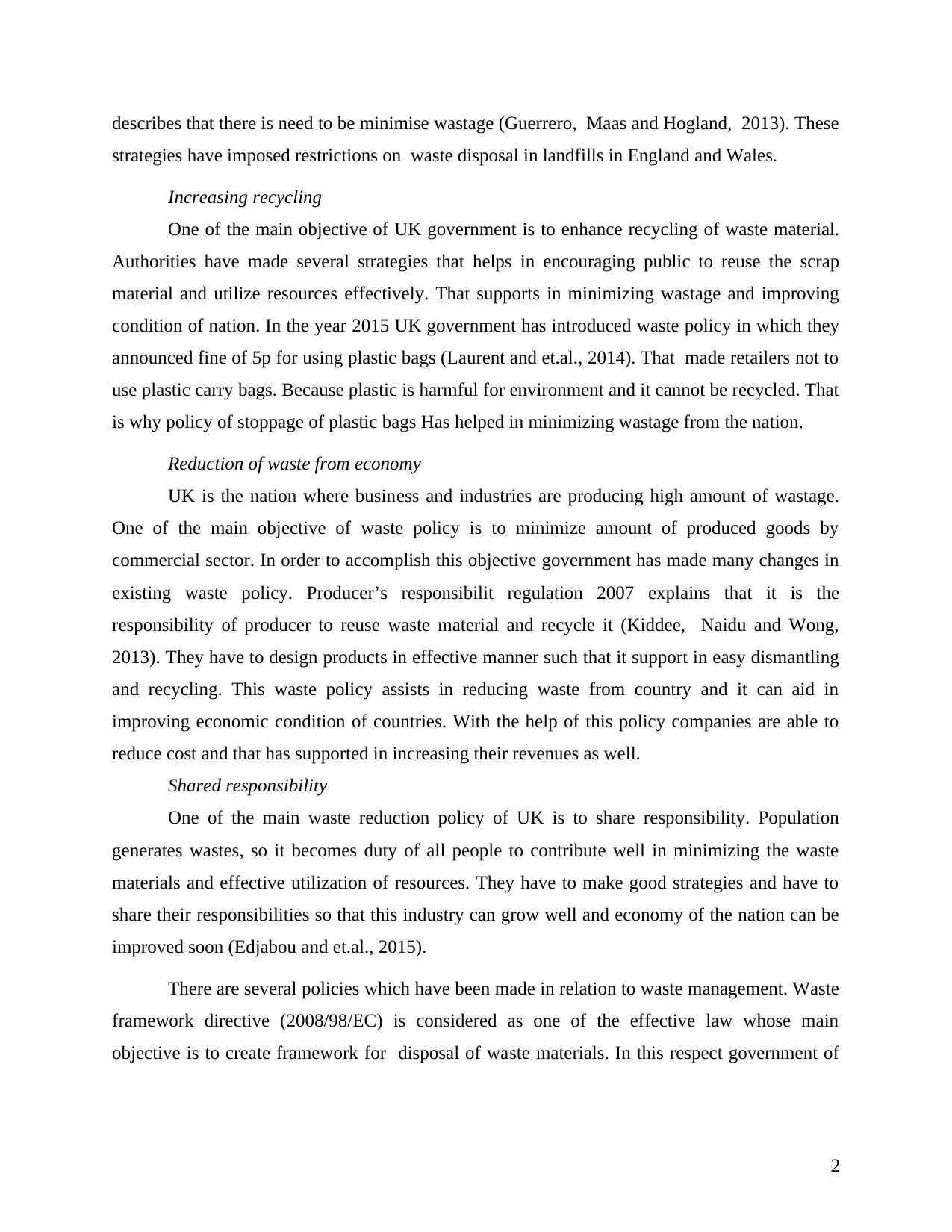
describes that there is need to be minimise wastage (Guerrero, Maas and Hogland, 2013). These
strategies have imposed restrictions on waste disposal in landfills in England and Wales.
Increasing recycling
One of the main objective of UK government is to enhance recycling of waste material.
Authorities have made several strategies that helps in encouraging public to reuse the scrap
material and utilize resources effectively. That supports in minimizing wastage and improving
condition of nation. In the year 2015 UK government has introduced waste policy in which they
announced fine of 5p for using plastic bags (Laurent and et.al., 2014). That made retailers not to
use plastic carry bags. Because plastic is harmful for environment and it cannot be recycled. That
is why policy of stoppage of plastic bags Has helped in minimizing wastage from the nation.
Reduction of waste from economy
UK is the nation where business and industries are producing high amount of wastage.
One of the main objective of waste policy is to minimize amount of produced goods by
commercial sector. In order to accomplish this objective government has made many changes in
existing waste policy. Producer’s responsibilit regulation 2007 explains that it is the
responsibility of producer to reuse waste material and recycle it (Kiddee, Naidu and Wong,
2013). They have to design products in effective manner such that it support in easy dismantling
and recycling. This waste policy assists in reducing waste from country and it can aid in
improving economic condition of countries. With the help of this policy companies are able to
reduce cost and that has supported in increasing their revenues as well.
Shared responsibility
One of the main waste reduction policy of UK is to share responsibility. Population
generates wastes, so it becomes duty of all people to contribute well in minimizing the waste
materials and effective utilization of resources. They have to make good strategies and have to
share their responsibilities so that this industry can grow well and economy of the nation can be
improved soon (Edjabou and et.al., 2015).
There are several policies which have been made in relation to waste management. Waste
framework directive (2008/98/EC) is considered as one of the effective law whose main
objective is to create framework for disposal of waste materials. In this respect government of
2
strategies have imposed restrictions on waste disposal in landfills in England and Wales.
Increasing recycling
One of the main objective of UK government is to enhance recycling of waste material.
Authorities have made several strategies that helps in encouraging public to reuse the scrap
material and utilize resources effectively. That supports in minimizing wastage and improving
condition of nation. In the year 2015 UK government has introduced waste policy in which they
announced fine of 5p for using plastic bags (Laurent and et.al., 2014). That made retailers not to
use plastic carry bags. Because plastic is harmful for environment and it cannot be recycled. That
is why policy of stoppage of plastic bags Has helped in minimizing wastage from the nation.
Reduction of waste from economy
UK is the nation where business and industries are producing high amount of wastage.
One of the main objective of waste policy is to minimize amount of produced goods by
commercial sector. In order to accomplish this objective government has made many changes in
existing waste policy. Producer’s responsibilit regulation 2007 explains that it is the
responsibility of producer to reuse waste material and recycle it (Kiddee, Naidu and Wong,
2013). They have to design products in effective manner such that it support in easy dismantling
and recycling. This waste policy assists in reducing waste from country and it can aid in
improving economic condition of countries. With the help of this policy companies are able to
reduce cost and that has supported in increasing their revenues as well.
Shared responsibility
One of the main waste reduction policy of UK is to share responsibility. Population
generates wastes, so it becomes duty of all people to contribute well in minimizing the waste
materials and effective utilization of resources. They have to make good strategies and have to
share their responsibilities so that this industry can grow well and economy of the nation can be
improved soon (Edjabou and et.al., 2015).
There are several policies which have been made in relation to waste management. Waste
framework directive (2008/98/EC) is considered as one of the effective law whose main
objective is to create framework for disposal of waste materials. In this respect government of
2
Paraphrase This Document
Need a fresh take? Get an instant paraphrase of this document with our AI Paraphraser
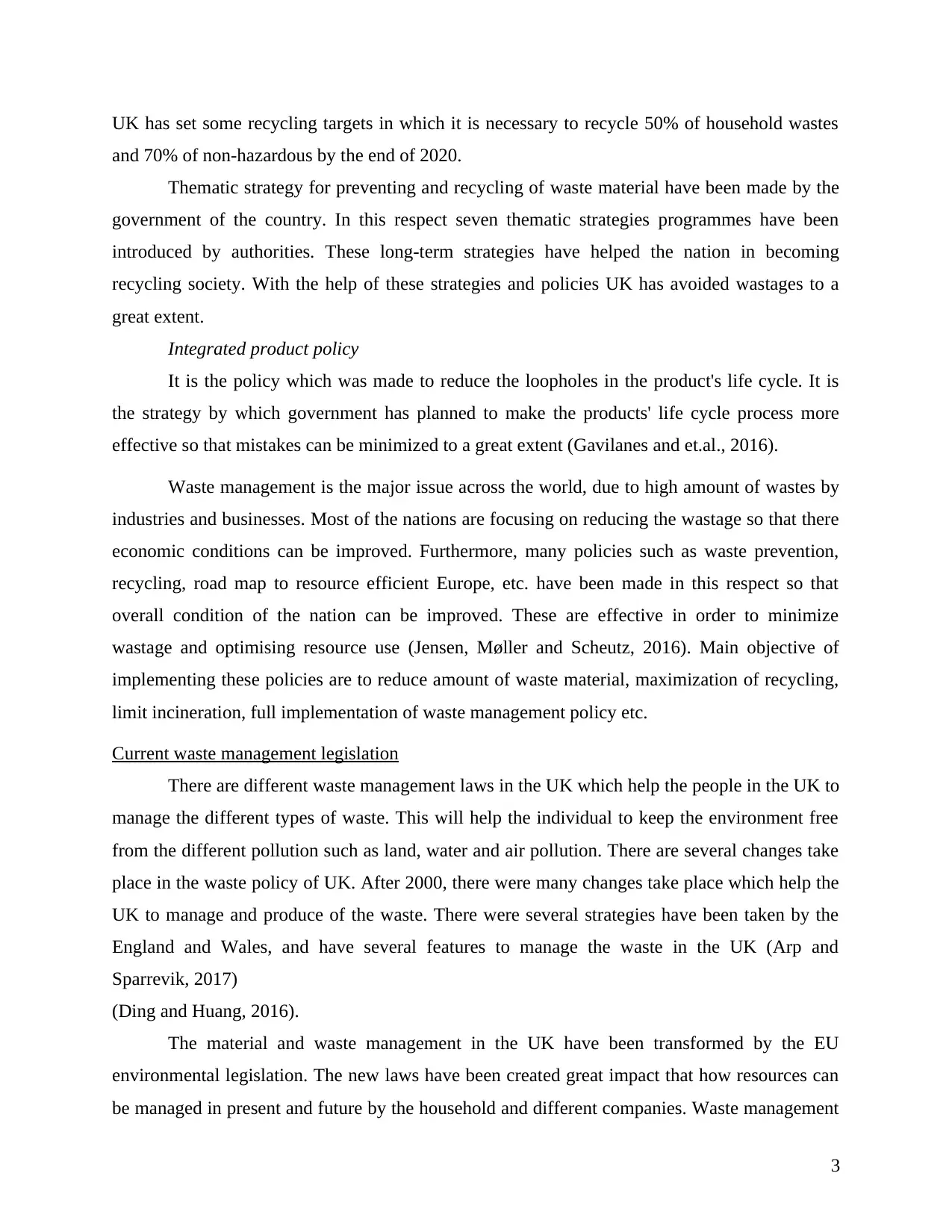
UK has set some recycling targets in which it is necessary to recycle 50% of household wastes
and 70% of non-hazardous by the end of 2020.
Thematic strategy for preventing and recycling of waste material have been made by the
government of the country. In this respect seven thematic strategies programmes have been
introduced by authorities. These long-term strategies have helped the nation in becoming
recycling society. With the help of these strategies and policies UK has avoided wastages to a
great extent.
Integrated product policy
It is the policy which was made to reduce the loopholes in the product's life cycle. It is
the strategy by which government has planned to make the products' life cycle process more
effective so that mistakes can be minimized to a great extent (Gavilanes and et.al., 2016).
Waste management is the major issue across the world, due to high amount of wastes by
industries and businesses. Most of the nations are focusing on reducing the wastage so that there
economic conditions can be improved. Furthermore, many policies such as waste prevention,
recycling, road map to resource efficient Europe, etc. have been made in this respect so that
overall condition of the nation can be improved. These are effective in order to minimize
wastage and optimising resource use (Jensen, Møller and Scheutz, 2016). Main objective of
implementing these policies are to reduce amount of waste material, maximization of recycling,
limit incineration, full implementation of waste management policy etc.
Current waste management legislation
There are different waste management laws in the UK which help the people in the UK to
manage the different types of waste. This will help the individual to keep the environment free
from the different pollution such as land, water and air pollution. There are several changes take
place in the waste policy of UK. After 2000, there were many changes take place which help the
UK to manage and produce of the waste. There were several strategies have been taken by the
England and Wales, and have several features to manage the waste in the UK (Arp and
Sparrevik, 2017)
(Ding and Huang, 2016).
The material and waste management in the UK have been transformed by the EU
environmental legislation. The new laws have been created great impact that how resources can
be managed in present and future by the household and different companies. Waste management
3
and 70% of non-hazardous by the end of 2020.
Thematic strategy for preventing and recycling of waste material have been made by the
government of the country. In this respect seven thematic strategies programmes have been
introduced by authorities. These long-term strategies have helped the nation in becoming
recycling society. With the help of these strategies and policies UK has avoided wastages to a
great extent.
Integrated product policy
It is the policy which was made to reduce the loopholes in the product's life cycle. It is
the strategy by which government has planned to make the products' life cycle process more
effective so that mistakes can be minimized to a great extent (Gavilanes and et.al., 2016).
Waste management is the major issue across the world, due to high amount of wastes by
industries and businesses. Most of the nations are focusing on reducing the wastage so that there
economic conditions can be improved. Furthermore, many policies such as waste prevention,
recycling, road map to resource efficient Europe, etc. have been made in this respect so that
overall condition of the nation can be improved. These are effective in order to minimize
wastage and optimising resource use (Jensen, Møller and Scheutz, 2016). Main objective of
implementing these policies are to reduce amount of waste material, maximization of recycling,
limit incineration, full implementation of waste management policy etc.
Current waste management legislation
There are different waste management laws in the UK which help the people in the UK to
manage the different types of waste. This will help the individual to keep the environment free
from the different pollution such as land, water and air pollution. There are several changes take
place in the waste policy of UK. After 2000, there were many changes take place which help the
UK to manage and produce of the waste. There were several strategies have been taken by the
England and Wales, and have several features to manage the waste in the UK (Arp and
Sparrevik, 2017)
(Ding and Huang, 2016).
The material and waste management in the UK have been transformed by the EU
environmental legislation. The new laws have been created great impact that how resources can
be managed in present and future by the household and different companies. Waste management
3
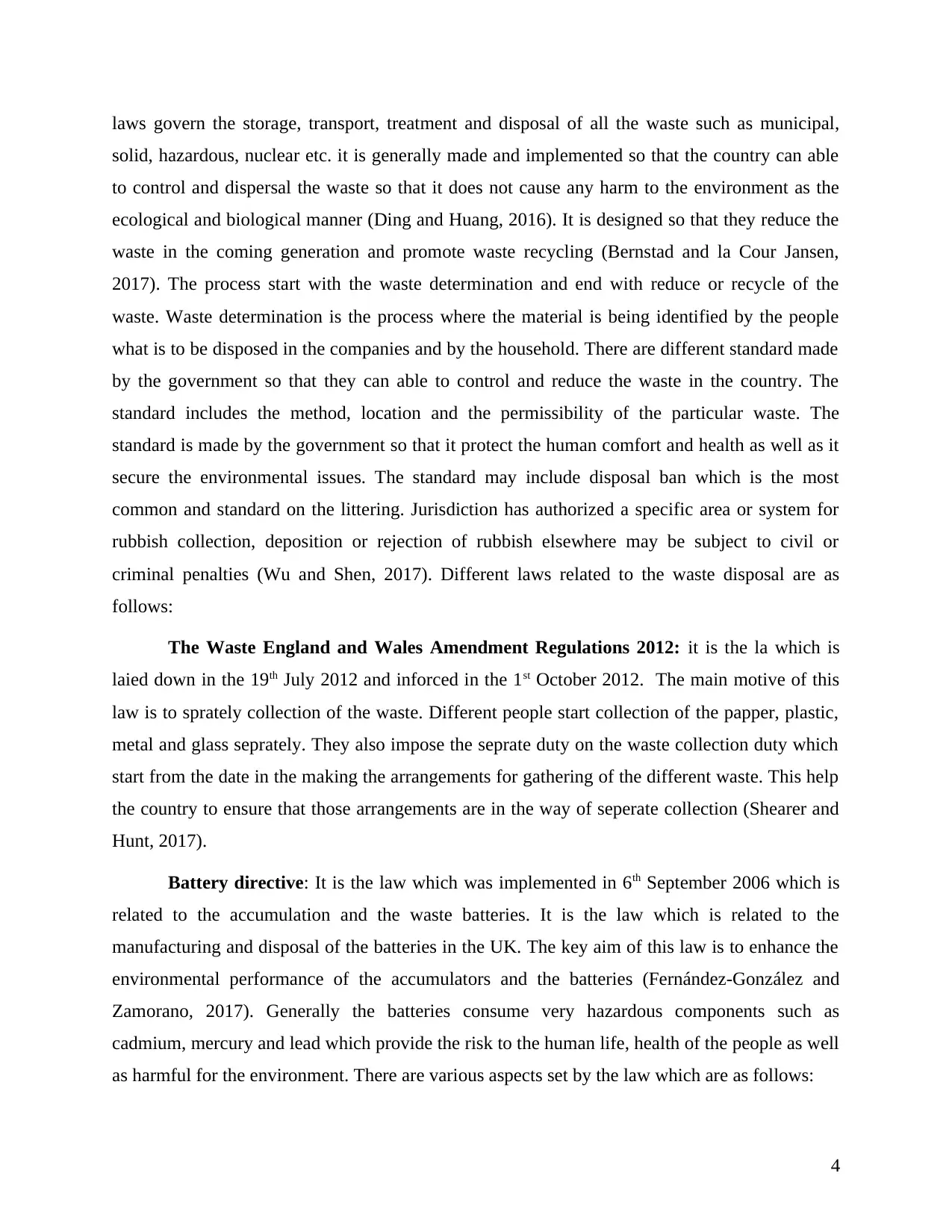
laws govern the storage, transport, treatment and disposal of all the waste such as municipal,
solid, hazardous, nuclear etc. it is generally made and implemented so that the country can able
to control and dispersal the waste so that it does not cause any harm to the environment as the
ecological and biological manner (Ding and Huang, 2016). It is designed so that they reduce the
waste in the coming generation and promote waste recycling (Bernstad and la Cour Jansen,
2017). The process start with the waste determination and end with reduce or recycle of the
waste. Waste determination is the process where the material is being identified by the people
what is to be disposed in the companies and by the household. There are different standard made
by the government so that they can able to control and reduce the waste in the country. The
standard includes the method, location and the permissibility of the particular waste. The
standard is made by the government so that it protect the human comfort and health as well as it
secure the environmental issues. The standard may include disposal ban which is the most
common and standard on the littering. Jurisdiction has authorized a specific area or system for
rubbish collection, deposition or rejection of rubbish elsewhere may be subject to civil or
criminal penalties (Wu and Shen, 2017). Different laws related to the waste disposal are as
follows:
The Waste England and Wales Amendment Regulations 2012: it is the la which is
laied down in the 19th July 2012 and inforced in the 1st October 2012. The main motive of this
law is to sprately collection of the waste. Different people start collection of the papper, plastic,
metal and glass seprately. They also impose the seprate duty on the waste collection duty which
start from the date in the making the arrangements for gathering of the different waste. This help
the country to ensure that those arrangements are in the way of seperate collection (Shearer and
Hunt, 2017).
Battery directive: It is the law which was implemented in 6th September 2006 which is
related to the accumulation and the waste batteries. It is the law which is related to the
manufacturing and disposal of the batteries in the UK. The key aim of this law is to enhance the
environmental performance of the accumulators and the batteries (Fernández-González and
Zamorano, 2017). Generally the batteries consume very hazardous components such as
cadmium, mercury and lead which provide the risk to the human life, health of the people as well
as harmful for the environment. There are various aspects set by the law which are as follows:
4
solid, hazardous, nuclear etc. it is generally made and implemented so that the country can able
to control and dispersal the waste so that it does not cause any harm to the environment as the
ecological and biological manner (Ding and Huang, 2016). It is designed so that they reduce the
waste in the coming generation and promote waste recycling (Bernstad and la Cour Jansen,
2017). The process start with the waste determination and end with reduce or recycle of the
waste. Waste determination is the process where the material is being identified by the people
what is to be disposed in the companies and by the household. There are different standard made
by the government so that they can able to control and reduce the waste in the country. The
standard includes the method, location and the permissibility of the particular waste. The
standard is made by the government so that it protect the human comfort and health as well as it
secure the environmental issues. The standard may include disposal ban which is the most
common and standard on the littering. Jurisdiction has authorized a specific area or system for
rubbish collection, deposition or rejection of rubbish elsewhere may be subject to civil or
criminal penalties (Wu and Shen, 2017). Different laws related to the waste disposal are as
follows:
The Waste England and Wales Amendment Regulations 2012: it is the la which is
laied down in the 19th July 2012 and inforced in the 1st October 2012. The main motive of this
law is to sprately collection of the waste. Different people start collection of the papper, plastic,
metal and glass seprately. They also impose the seprate duty on the waste collection duty which
start from the date in the making the arrangements for gathering of the different waste. This help
the country to ensure that those arrangements are in the way of seperate collection (Shearer and
Hunt, 2017).
Battery directive: It is the law which was implemented in 6th September 2006 which is
related to the accumulation and the waste batteries. It is the law which is related to the
manufacturing and disposal of the batteries in the UK. The key aim of this law is to enhance the
environmental performance of the accumulators and the batteries (Fernández-González and
Zamorano, 2017). Generally the batteries consume very hazardous components such as
cadmium, mercury and lead which provide the risk to the human life, health of the people as well
as harmful for the environment. There are various aspects set by the law which are as follows:
4
⊘ This is a preview!⊘
Do you want full access?
Subscribe today to unlock all pages.

Trusted by 1+ million students worldwide
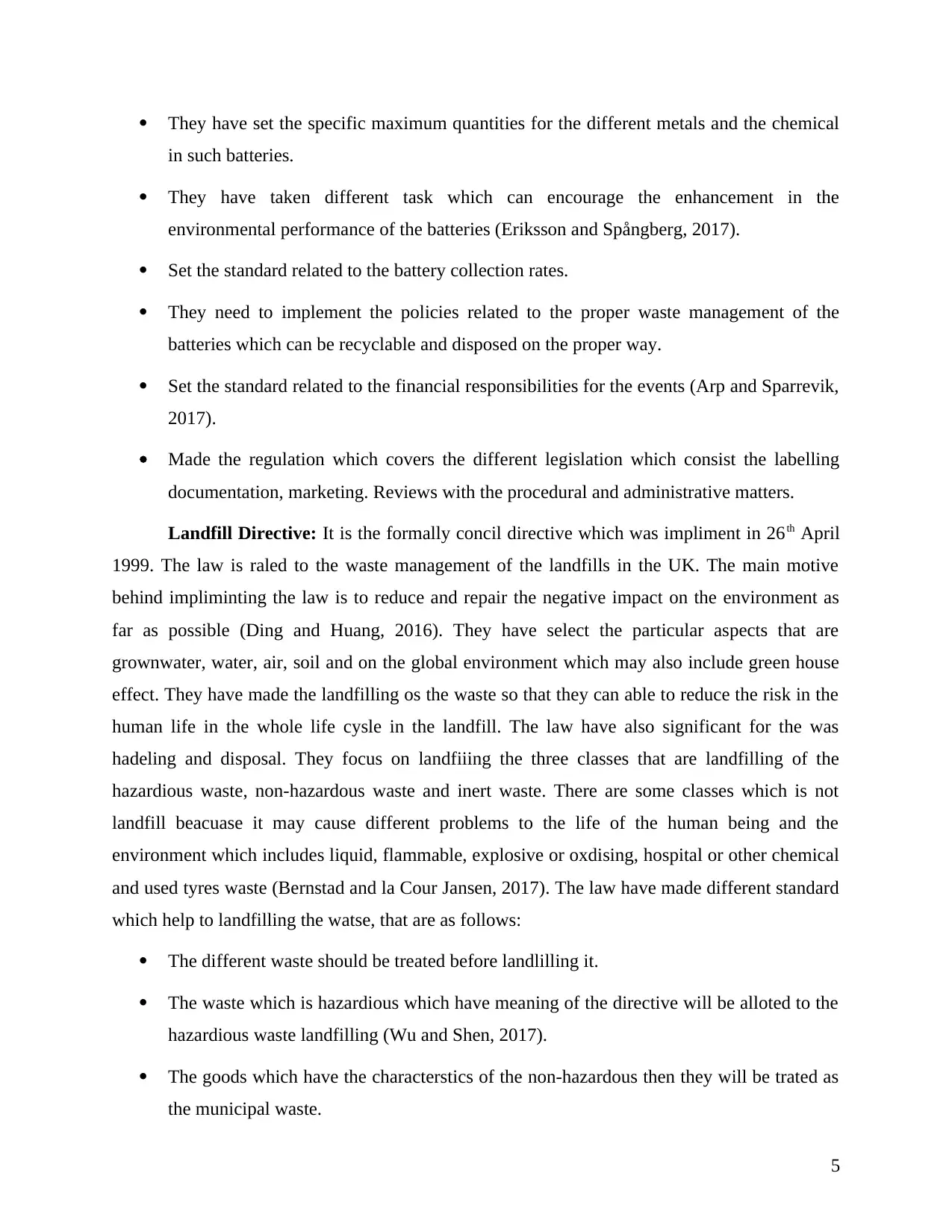
They have set the specific maximum quantities for the different metals and the chemical
in such batteries.
They have taken different task which can encourage the enhancement in the
environmental performance of the batteries (Eriksson and Spångberg, 2017).
Set the standard related to the battery collection rates.
They need to implement the policies related to the proper waste management of the
batteries which can be recyclable and disposed on the proper way.
Set the standard related to the financial responsibilities for the events (Arp and Sparrevik,
2017).
Made the regulation which covers the different legislation which consist the labelling
documentation, marketing. Reviews with the procedural and administrative matters.
Landfill Directive: It is the formally concil directive which was impliment in 26th April
1999. The law is raled to the waste management of the landfills in the UK. The main motive
behind impliminting the law is to reduce and repair the negative impact on the environment as
far as possible (Ding and Huang, 2016). They have select the particular aspects that are
grownwater, water, air, soil and on the global environment which may also include green house
effect. They have made the landfilling os the waste so that they can able to reduce the risk in the
human life in the whole life cysle in the landfill. The law have also significant for the was
hadeling and disposal. They focus on landfiiing the three classes that are landfilling of the
hazardious waste, non-hazardous waste and inert waste. There are some classes which is not
landfill beacuase it may cause different problems to the life of the human being and the
environment which includes liquid, flammable, explosive or oxdising, hospital or other chemical
and used tyres waste (Bernstad and la Cour Jansen, 2017). The law have made different standard
which help to landfilling the watse, that are as follows:
The different waste should be treated before landlilling it.
The waste which is hazardious which have meaning of the directive will be alloted to the
hazardious waste landfilling (Wu and Shen, 2017).
The goods which have the characterstics of the non-hazardous then they will be trated as
the municipal waste.
5
in such batteries.
They have taken different task which can encourage the enhancement in the
environmental performance of the batteries (Eriksson and Spångberg, 2017).
Set the standard related to the battery collection rates.
They need to implement the policies related to the proper waste management of the
batteries which can be recyclable and disposed on the proper way.
Set the standard related to the financial responsibilities for the events (Arp and Sparrevik,
2017).
Made the regulation which covers the different legislation which consist the labelling
documentation, marketing. Reviews with the procedural and administrative matters.
Landfill Directive: It is the formally concil directive which was impliment in 26th April
1999. The law is raled to the waste management of the landfills in the UK. The main motive
behind impliminting the law is to reduce and repair the negative impact on the environment as
far as possible (Ding and Huang, 2016). They have select the particular aspects that are
grownwater, water, air, soil and on the global environment which may also include green house
effect. They have made the landfilling os the waste so that they can able to reduce the risk in the
human life in the whole life cysle in the landfill. The law have also significant for the was
hadeling and disposal. They focus on landfiiing the three classes that are landfilling of the
hazardious waste, non-hazardous waste and inert waste. There are some classes which is not
landfill beacuase it may cause different problems to the life of the human being and the
environment which includes liquid, flammable, explosive or oxdising, hospital or other chemical
and used tyres waste (Bernstad and la Cour Jansen, 2017). The law have made different standard
which help to landfilling the watse, that are as follows:
The different waste should be treated before landlilling it.
The waste which is hazardious which have meaning of the directive will be alloted to the
hazardious waste landfilling (Wu and Shen, 2017).
The goods which have the characterstics of the non-hazardous then they will be trated as
the municipal waste.
5
Paraphrase This Document
Need a fresh take? Get an instant paraphrase of this document with our AI Paraphraser
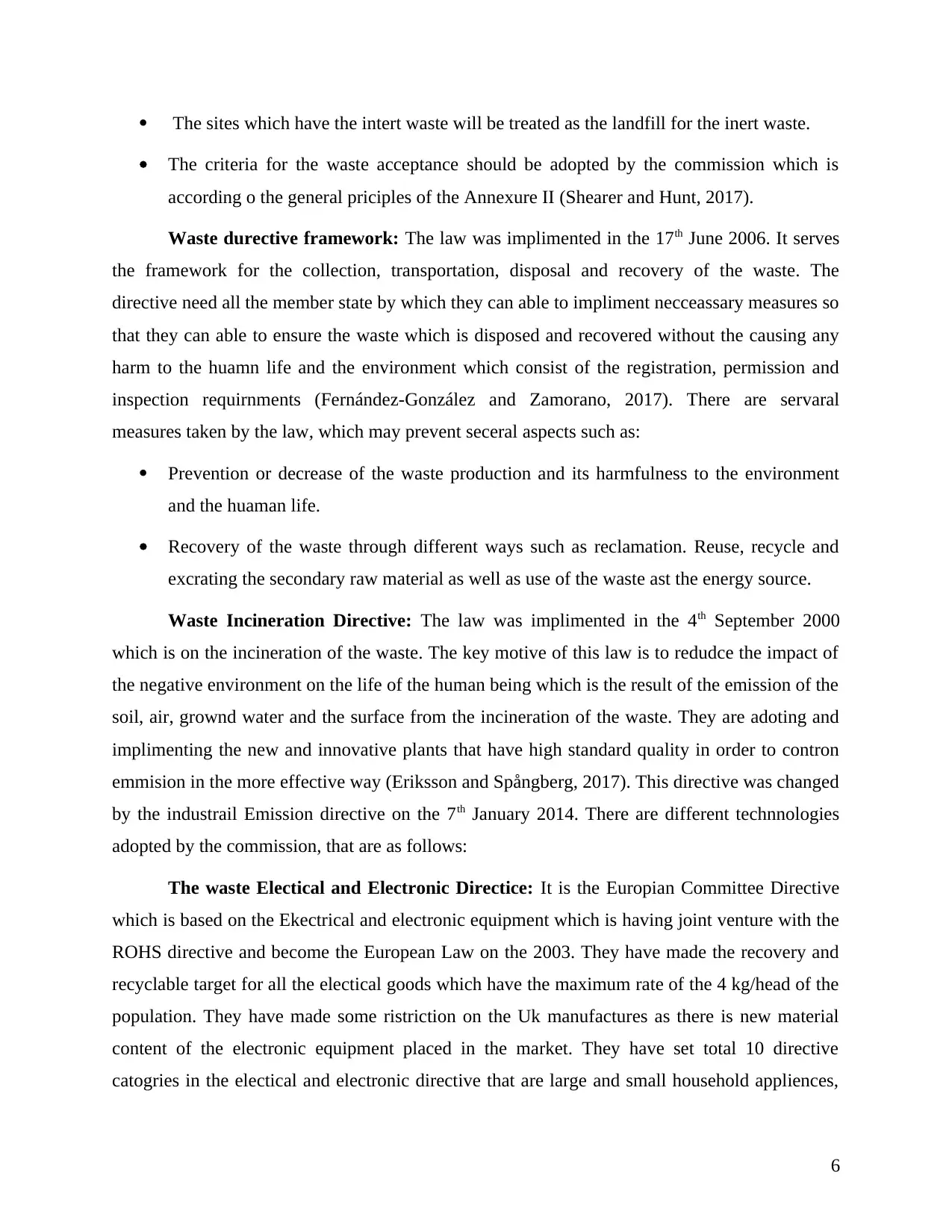
The sites which have the intert waste will be treated as the landfill for the inert waste.
The criteria for the waste acceptance should be adopted by the commission which is
according o the general priciples of the Annexure II (Shearer and Hunt, 2017).
Waste durective framework: The law was implimented in the 17th June 2006. It serves
the framework for the collection, transportation, disposal and recovery of the waste. The
directive need all the member state by which they can able to impliment necceassary measures so
that they can able to ensure the waste which is disposed and recovered without the causing any
harm to the huamn life and the environment which consist of the registration, permission and
inspection requirnments (Fernández-González and Zamorano, 2017). There are servaral
measures taken by the law, which may prevent seceral aspects such as:
Prevention or decrease of the waste production and its harmfulness to the environment
and the huaman life.
Recovery of the waste through different ways such as reclamation. Reuse, recycle and
excrating the secondary raw material as well as use of the waste ast the energy source.
Waste Incineration Directive: The law was implimented in the 4th September 2000
which is on the incineration of the waste. The key motive of this law is to redudce the impact of
the negative environment on the life of the human being which is the result of the emission of the
soil, air, grownd water and the surface from the incineration of the waste. They are adoting and
implimenting the new and innovative plants that have high standard quality in order to contron
emmision in the more effective way (Eriksson and Spångberg, 2017). This directive was changed
by the industrail Emission directive on the 7th January 2014. There are different technnologies
adopted by the commission, that are as follows:
The waste Electical and Electronic Directice: It is the Europian Committee Directive
which is based on the Ekectrical and electronic equipment which is having joint venture with the
ROHS directive and become the European Law on the 2003. They have made the recovery and
recyclable target for all the electical goods which have the maximum rate of the 4 kg/head of the
population. They have made some ristriction on the Uk manufactures as there is new material
content of the electronic equipment placed in the market. They have set total 10 directive
catogries in the electical and electronic directive that are large and small household appliences,
6
The criteria for the waste acceptance should be adopted by the commission which is
according o the general priciples of the Annexure II (Shearer and Hunt, 2017).
Waste durective framework: The law was implimented in the 17th June 2006. It serves
the framework for the collection, transportation, disposal and recovery of the waste. The
directive need all the member state by which they can able to impliment necceassary measures so
that they can able to ensure the waste which is disposed and recovered without the causing any
harm to the huamn life and the environment which consist of the registration, permission and
inspection requirnments (Fernández-González and Zamorano, 2017). There are servaral
measures taken by the law, which may prevent seceral aspects such as:
Prevention or decrease of the waste production and its harmfulness to the environment
and the huaman life.
Recovery of the waste through different ways such as reclamation. Reuse, recycle and
excrating the secondary raw material as well as use of the waste ast the energy source.
Waste Incineration Directive: The law was implimented in the 4th September 2000
which is on the incineration of the waste. The key motive of this law is to redudce the impact of
the negative environment on the life of the human being which is the result of the emission of the
soil, air, grownd water and the surface from the incineration of the waste. They are adoting and
implimenting the new and innovative plants that have high standard quality in order to contron
emmision in the more effective way (Eriksson and Spångberg, 2017). This directive was changed
by the industrail Emission directive on the 7th January 2014. There are different technnologies
adopted by the commission, that are as follows:
The waste Electical and Electronic Directice: It is the Europian Committee Directive
which is based on the Ekectrical and electronic equipment which is having joint venture with the
ROHS directive and become the European Law on the 2003. They have made the recovery and
recyclable target for all the electical goods which have the maximum rate of the 4 kg/head of the
population. They have made some ristriction on the Uk manufactures as there is new material
content of the electronic equipment placed in the market. They have set total 10 directive
catogries in the electical and electronic directive that are large and small household appliences,
6
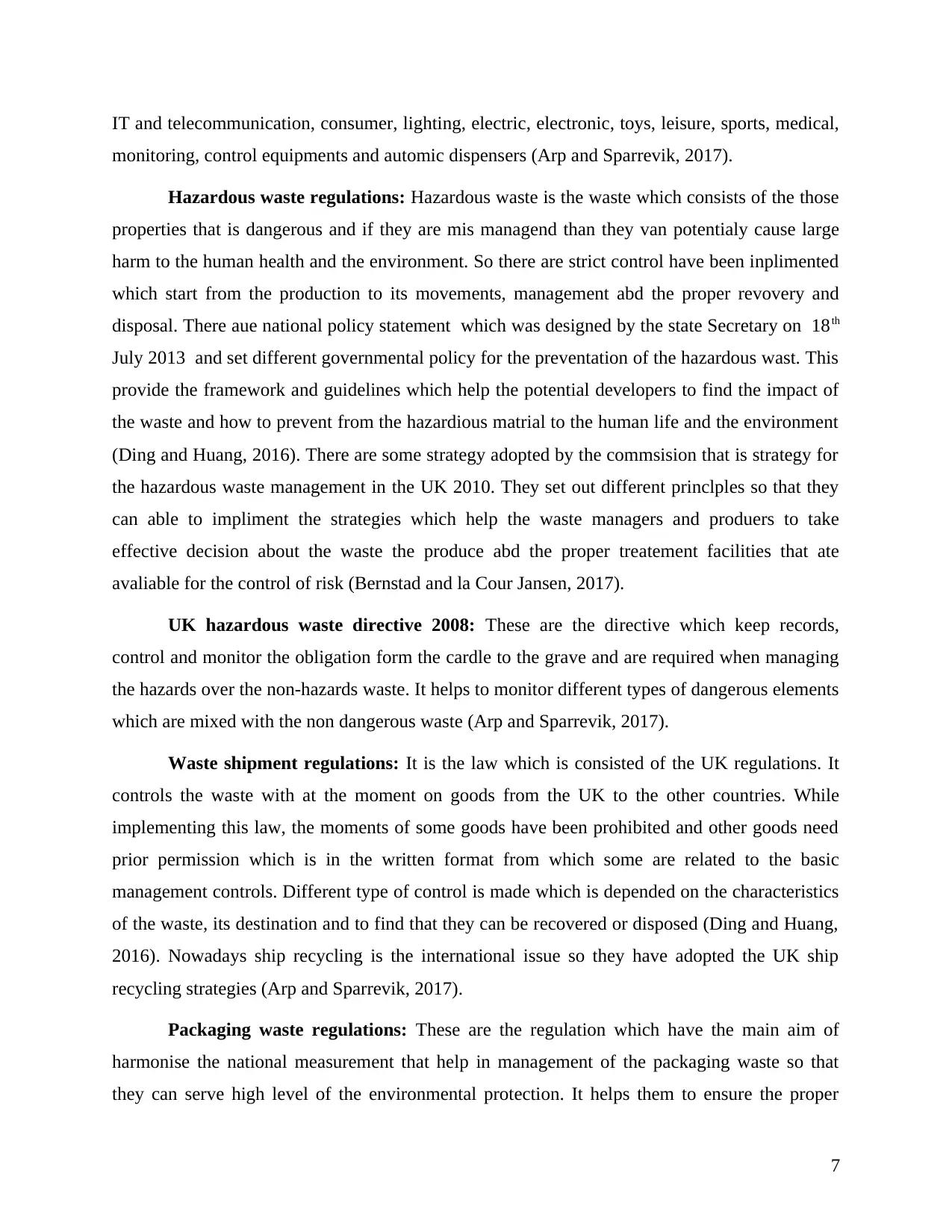
IT and telecommunication, consumer, lighting, electric, electronic, toys, leisure, sports, medical,
monitoring, control equipments and automic dispensers (Arp and Sparrevik, 2017).
Hazardous waste regulations: Hazardous waste is the waste which consists of the those
properties that is dangerous and if they are mis managend than they van potentialy cause large
harm to the human health and the environment. So there are strict control have been inplimented
which start from the production to its movements, management abd the proper revovery and
disposal. There aue national policy statement which was designed by the state Secretary on 18th
July 2013 and set different governmental policy for the preventation of the hazardous wast. This
provide the framework and guidelines which help the potential developers to find the impact of
the waste and how to prevent from the hazardious matrial to the human life and the environment
(Ding and Huang, 2016). There are some strategy adopted by the commsision that is strategy for
the hazardous waste management in the UK 2010. They set out different princlples so that they
can able to impliment the strategies which help the waste managers and produers to take
effective decision about the waste the produce abd the proper treatement facilities that ate
avaliable for the control of risk (Bernstad and la Cour Jansen, 2017).
UK hazardous waste directive 2008: These are the directive which keep records,
control and monitor the obligation form the cardle to the grave and are required when managing
the hazards over the non-hazards waste. It helps to monitor different types of dangerous elements
which are mixed with the non dangerous waste (Arp and Sparrevik, 2017).
Waste shipment regulations: It is the law which is consisted of the UK regulations. It
controls the waste with at the moment on goods from the UK to the other countries. While
implementing this law, the moments of some goods have been prohibited and other goods need
prior permission which is in the written format from which some are related to the basic
management controls. Different type of control is made which is depended on the characteristics
of the waste, its destination and to find that they can be recovered or disposed (Ding and Huang,
2016). Nowadays ship recycling is the international issue so they have adopted the UK ship
recycling strategies (Arp and Sparrevik, 2017).
Packaging waste regulations: These are the regulation which have the main aim of
harmonise the national measurement that help in management of the packaging waste so that
they can serve high level of the environmental protection. It helps them to ensure the proper
7
monitoring, control equipments and automic dispensers (Arp and Sparrevik, 2017).
Hazardous waste regulations: Hazardous waste is the waste which consists of the those
properties that is dangerous and if they are mis managend than they van potentialy cause large
harm to the human health and the environment. So there are strict control have been inplimented
which start from the production to its movements, management abd the proper revovery and
disposal. There aue national policy statement which was designed by the state Secretary on 18th
July 2013 and set different governmental policy for the preventation of the hazardous wast. This
provide the framework and guidelines which help the potential developers to find the impact of
the waste and how to prevent from the hazardious matrial to the human life and the environment
(Ding and Huang, 2016). There are some strategy adopted by the commsision that is strategy for
the hazardous waste management in the UK 2010. They set out different princlples so that they
can able to impliment the strategies which help the waste managers and produers to take
effective decision about the waste the produce abd the proper treatement facilities that ate
avaliable for the control of risk (Bernstad and la Cour Jansen, 2017).
UK hazardous waste directive 2008: These are the directive which keep records,
control and monitor the obligation form the cardle to the grave and are required when managing
the hazards over the non-hazards waste. It helps to monitor different types of dangerous elements
which are mixed with the non dangerous waste (Arp and Sparrevik, 2017).
Waste shipment regulations: It is the law which is consisted of the UK regulations. It
controls the waste with at the moment on goods from the UK to the other countries. While
implementing this law, the moments of some goods have been prohibited and other goods need
prior permission which is in the written format from which some are related to the basic
management controls. Different type of control is made which is depended on the characteristics
of the waste, its destination and to find that they can be recovered or disposed (Ding and Huang,
2016). Nowadays ship recycling is the international issue so they have adopted the UK ship
recycling strategies (Arp and Sparrevik, 2017).
Packaging waste regulations: These are the regulation which have the main aim of
harmonise the national measurement that help in management of the packaging waste so that
they can serve high level of the environmental protection. It helps them to ensure the proper
7
⊘ This is a preview!⊘
Do you want full access?
Subscribe today to unlock all pages.

Trusted by 1+ million students worldwide
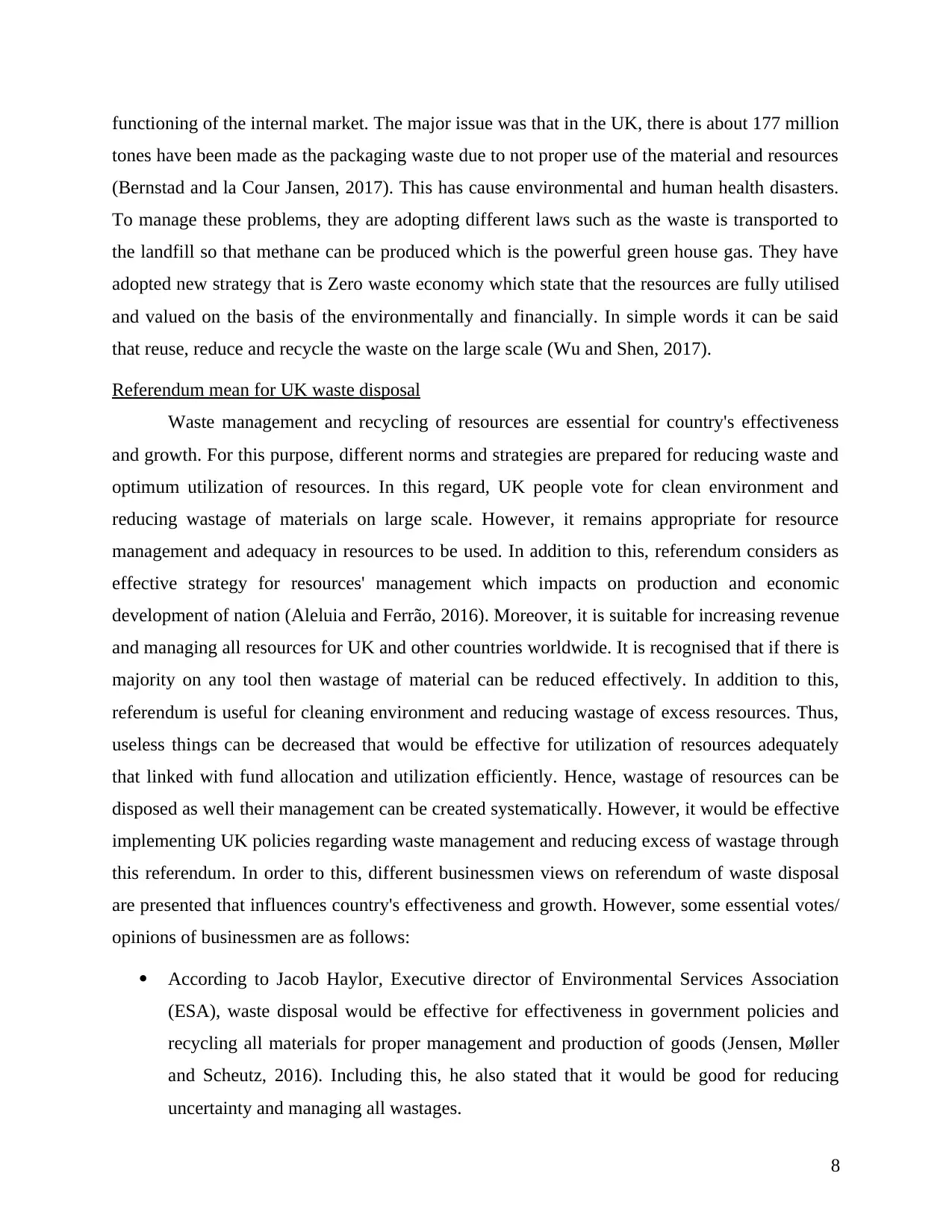
functioning of the internal market. The major issue was that in the UK, there is about 177 million
tones have been made as the packaging waste due to not proper use of the material and resources
(Bernstad and la Cour Jansen, 2017). This has cause environmental and human health disasters.
To manage these problems, they are adopting different laws such as the waste is transported to
the landfill so that methane can be produced which is the powerful green house gas. They have
adopted new strategy that is Zero waste economy which state that the resources are fully utilised
and valued on the basis of the environmentally and financially. In simple words it can be said
that reuse, reduce and recycle the waste on the large scale (Wu and Shen, 2017).
Referendum mean for UK waste disposal
Waste management and recycling of resources are essential for country's effectiveness
and growth. For this purpose, different norms and strategies are prepared for reducing waste and
optimum utilization of resources. In this regard, UK people vote for clean environment and
reducing wastage of materials on large scale. However, it remains appropriate for resource
management and adequacy in resources to be used. In addition to this, referendum considers as
effective strategy for resources' management which impacts on production and economic
development of nation (Aleluia and Ferrão, 2016). Moreover, it is suitable for increasing revenue
and managing all resources for UK and other countries worldwide. It is recognised that if there is
majority on any tool then wastage of material can be reduced effectively. In addition to this,
referendum is useful for cleaning environment and reducing wastage of excess resources. Thus,
useless things can be decreased that would be effective for utilization of resources adequately
that linked with fund allocation and utilization efficiently. Hence, wastage of resources can be
disposed as well their management can be created systematically. However, it would be effective
implementing UK policies regarding waste management and reducing excess of wastage through
this referendum. In order to this, different businessmen views on referendum of waste disposal
are presented that influences country's effectiveness and growth. However, some essential votes/
opinions of businessmen are as follows:
According to Jacob Haylor, Executive director of Environmental Services Association
(ESA), waste disposal would be effective for effectiveness in government policies and
recycling all materials for proper management and production of goods (Jensen, Møller
and Scheutz, 2016). Including this, he also stated that it would be good for reducing
uncertainty and managing all wastages.
8
tones have been made as the packaging waste due to not proper use of the material and resources
(Bernstad and la Cour Jansen, 2017). This has cause environmental and human health disasters.
To manage these problems, they are adopting different laws such as the waste is transported to
the landfill so that methane can be produced which is the powerful green house gas. They have
adopted new strategy that is Zero waste economy which state that the resources are fully utilised
and valued on the basis of the environmentally and financially. In simple words it can be said
that reuse, reduce and recycle the waste on the large scale (Wu and Shen, 2017).
Referendum mean for UK waste disposal
Waste management and recycling of resources are essential for country's effectiveness
and growth. For this purpose, different norms and strategies are prepared for reducing waste and
optimum utilization of resources. In this regard, UK people vote for clean environment and
reducing wastage of materials on large scale. However, it remains appropriate for resource
management and adequacy in resources to be used. In addition to this, referendum considers as
effective strategy for resources' management which impacts on production and economic
development of nation (Aleluia and Ferrão, 2016). Moreover, it is suitable for increasing revenue
and managing all resources for UK and other countries worldwide. It is recognised that if there is
majority on any tool then wastage of material can be reduced effectively. In addition to this,
referendum is useful for cleaning environment and reducing wastage of excess resources. Thus,
useless things can be decreased that would be effective for utilization of resources adequately
that linked with fund allocation and utilization efficiently. Hence, wastage of resources can be
disposed as well their management can be created systematically. However, it would be effective
implementing UK policies regarding waste management and reducing excess of wastage through
this referendum. In order to this, different businessmen views on referendum of waste disposal
are presented that influences country's effectiveness and growth. However, some essential votes/
opinions of businessmen are as follows:
According to Jacob Haylor, Executive director of Environmental Services Association
(ESA), waste disposal would be effective for effectiveness in government policies and
recycling all materials for proper management and production of goods (Jensen, Møller
and Scheutz, 2016). Including this, he also stated that it would be good for reducing
uncertainty and managing all wastages.
8
Paraphrase This Document
Need a fresh take? Get an instant paraphrase of this document with our AI Paraphraser
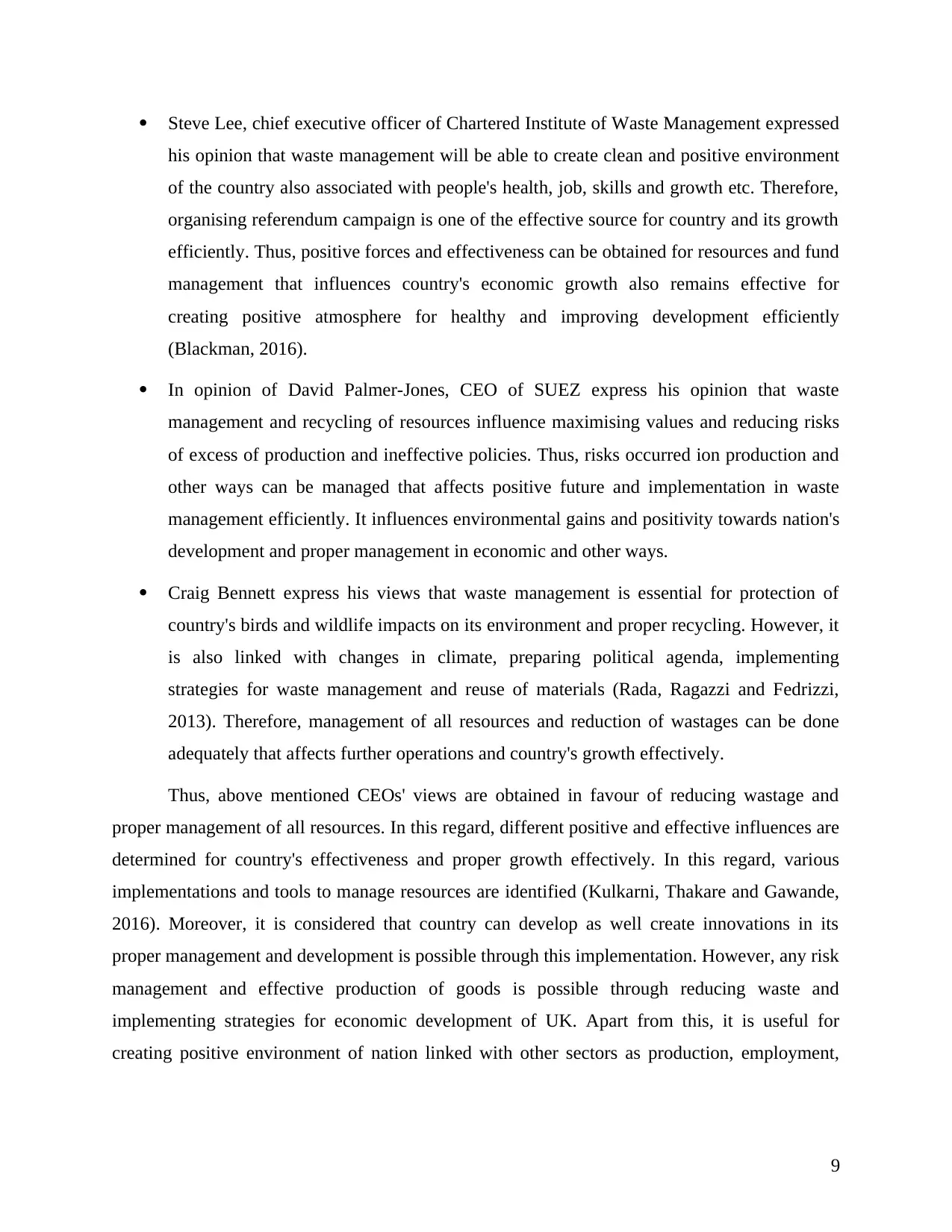
Steve Lee, chief executive officer of Chartered Institute of Waste Management expressed
his opinion that waste management will be able to create clean and positive environment
of the country also associated with people's health, job, skills and growth etc. Therefore,
organising referendum campaign is one of the effective source for country and its growth
efficiently. Thus, positive forces and effectiveness can be obtained for resources and fund
management that influences country's economic growth also remains effective for
creating positive atmosphere for healthy and improving development efficiently
(Blackman, 2016).
In opinion of David Palmer-Jones, CEO of SUEZ express his opinion that waste
management and recycling of resources influence maximising values and reducing risks
of excess of production and ineffective policies. Thus, risks occurred ion production and
other ways can be managed that affects positive future and implementation in waste
management efficiently. It influences environmental gains and positivity towards nation's
development and proper management in economic and other ways.
Craig Bennett express his views that waste management is essential for protection of
country's birds and wildlife impacts on its environment and proper recycling. However, it
is also linked with changes in climate, preparing political agenda, implementing
strategies for waste management and reuse of materials (Rada, Ragazzi and Fedrizzi,
2013). Therefore, management of all resources and reduction of wastages can be done
adequately that affects further operations and country's growth effectively.
Thus, above mentioned CEOs' views are obtained in favour of reducing wastage and
proper management of all resources. In this regard, different positive and effective influences are
determined for country's effectiveness and proper growth effectively. In this regard, various
implementations and tools to manage resources are identified (Kulkarni, Thakare and Gawande,
2016). Moreover, it is considered that country can develop as well create innovations in its
proper management and development is possible through this implementation. However, any risk
management and effective production of goods is possible through reducing waste and
implementing strategies for economic development of UK. Apart from this, it is useful for
creating positive environment of nation linked with other sectors as production, employment,
9
his opinion that waste management will be able to create clean and positive environment
of the country also associated with people's health, job, skills and growth etc. Therefore,
organising referendum campaign is one of the effective source for country and its growth
efficiently. Thus, positive forces and effectiveness can be obtained for resources and fund
management that influences country's economic growth also remains effective for
creating positive atmosphere for healthy and improving development efficiently
(Blackman, 2016).
In opinion of David Palmer-Jones, CEO of SUEZ express his opinion that waste
management and recycling of resources influence maximising values and reducing risks
of excess of production and ineffective policies. Thus, risks occurred ion production and
other ways can be managed that affects positive future and implementation in waste
management efficiently. It influences environmental gains and positivity towards nation's
development and proper management in economic and other ways.
Craig Bennett express his views that waste management is essential for protection of
country's birds and wildlife impacts on its environment and proper recycling. However, it
is also linked with changes in climate, preparing political agenda, implementing
strategies for waste management and reuse of materials (Rada, Ragazzi and Fedrizzi,
2013). Therefore, management of all resources and reduction of wastages can be done
adequately that affects further operations and country's growth effectively.
Thus, above mentioned CEOs' views are obtained in favour of reducing wastage and
proper management of all resources. In this regard, different positive and effective influences are
determined for country's effectiveness and proper growth effectively. In this regard, various
implementations and tools to manage resources are identified (Kulkarni, Thakare and Gawande,
2016). Moreover, it is considered that country can develop as well create innovations in its
proper management and development is possible through this implementation. However, any risk
management and effective production of goods is possible through reducing waste and
implementing strategies for economic development of UK. Apart from this, it is useful for
creating positive environment of nation linked with other sectors as production, employment,
9
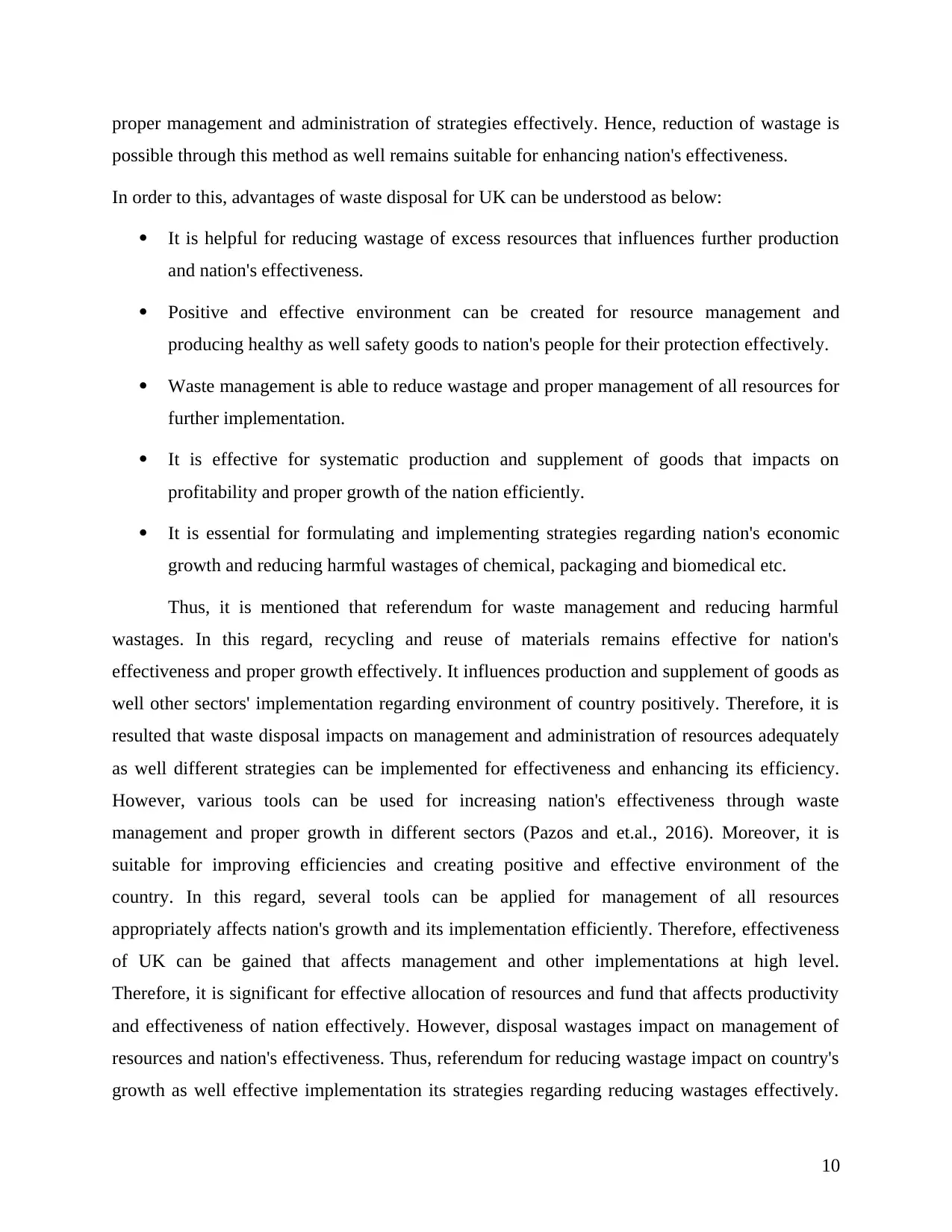
proper management and administration of strategies effectively. Hence, reduction of wastage is
possible through this method as well remains suitable for enhancing nation's effectiveness.
In order to this, advantages of waste disposal for UK can be understood as below:
It is helpful for reducing wastage of excess resources that influences further production
and nation's effectiveness.
Positive and effective environment can be created for resource management and
producing healthy as well safety goods to nation's people for their protection effectively.
Waste management is able to reduce wastage and proper management of all resources for
further implementation.
It is effective for systematic production and supplement of goods that impacts on
profitability and proper growth of the nation efficiently.
It is essential for formulating and implementing strategies regarding nation's economic
growth and reducing harmful wastages of chemical, packaging and biomedical etc.
Thus, it is mentioned that referendum for waste management and reducing harmful
wastages. In this regard, recycling and reuse of materials remains effective for nation's
effectiveness and proper growth effectively. It influences production and supplement of goods as
well other sectors' implementation regarding environment of country positively. Therefore, it is
resulted that waste disposal impacts on management and administration of resources adequately
as well different strategies can be implemented for effectiveness and enhancing its efficiency.
However, various tools can be used for increasing nation's effectiveness through waste
management and proper growth in different sectors (Pazos and et.al., 2016). Moreover, it is
suitable for improving efficiencies and creating positive and effective environment of the
country. In this regard, several tools can be applied for management of all resources
appropriately affects nation's growth and its implementation efficiently. Therefore, effectiveness
of UK can be gained that affects management and other implementations at high level.
Therefore, it is significant for effective allocation of resources and fund that affects productivity
and effectiveness of nation effectively. However, disposal wastages impact on management of
resources and nation's effectiveness. Thus, referendum for reducing wastage impact on country's
growth as well effective implementation its strategies regarding reducing wastages effectively.
10
possible through this method as well remains suitable for enhancing nation's effectiveness.
In order to this, advantages of waste disposal for UK can be understood as below:
It is helpful for reducing wastage of excess resources that influences further production
and nation's effectiveness.
Positive and effective environment can be created for resource management and
producing healthy as well safety goods to nation's people for their protection effectively.
Waste management is able to reduce wastage and proper management of all resources for
further implementation.
It is effective for systematic production and supplement of goods that impacts on
profitability and proper growth of the nation efficiently.
It is essential for formulating and implementing strategies regarding nation's economic
growth and reducing harmful wastages of chemical, packaging and biomedical etc.
Thus, it is mentioned that referendum for waste management and reducing harmful
wastages. In this regard, recycling and reuse of materials remains effective for nation's
effectiveness and proper growth effectively. It influences production and supplement of goods as
well other sectors' implementation regarding environment of country positively. Therefore, it is
resulted that waste disposal impacts on management and administration of resources adequately
as well different strategies can be implemented for effectiveness and enhancing its efficiency.
However, various tools can be used for increasing nation's effectiveness through waste
management and proper growth in different sectors (Pazos and et.al., 2016). Moreover, it is
suitable for improving efficiencies and creating positive and effective environment of the
country. In this regard, several tools can be applied for management of all resources
appropriately affects nation's growth and its implementation efficiently. Therefore, effectiveness
of UK can be gained that affects management and other implementations at high level.
Therefore, it is significant for effective allocation of resources and fund that affects productivity
and effectiveness of nation effectively. However, disposal wastages impact on management of
resources and nation's effectiveness. Thus, referendum for reducing wastage impact on country's
growth as well effective implementation its strategies regarding reducing wastages effectively.
10
⊘ This is a preview!⊘
Do you want full access?
Subscribe today to unlock all pages.

Trusted by 1+ million students worldwide
1 out of 21
Related Documents
Your All-in-One AI-Powered Toolkit for Academic Success.
+13062052269
info@desklib.com
Available 24*7 on WhatsApp / Email
![[object Object]](/_next/static/media/star-bottom.7253800d.svg)
Unlock your academic potential
Copyright © 2020–2026 A2Z Services. All Rights Reserved. Developed and managed by ZUCOL.




